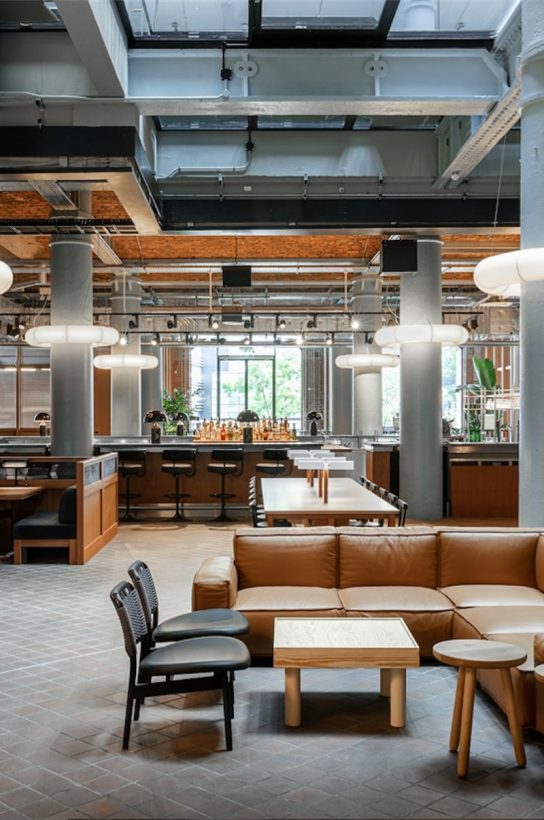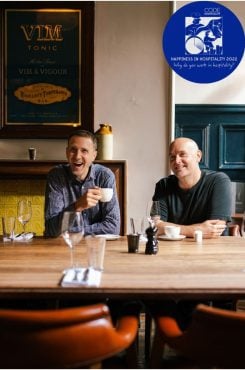

There’s been debate about the Manchester dining scene – from its lack of a Michelin star to its hard-to-please customers – for years. But a flurry of new openings, featuring stellar names like Tom Kerridge, and rave reviews for a new generation of restaurants, suggest that the city is ready to stake its claim as a culinary hotspot. Chloë Hamilton reports
We’re sitting at the ground floor bar at Tast. Fernando Marques, the general manager and industry thoroughbred, recounts a brief history of the business since opening on King Street in the summer of 2018. The restaurant, financed by Pep Guardiola and fronted by chef Paco Perez of two-star Miramar fame, has racked up a fair few column inches in the national press. Nicholas Lander, Giles Coren, Grace Dent and Michael Deacon were all largely positive about the venture – but it hasn’t necessarily translated into mainstream success. “There’s a value misconception about Spanish food,” says Marques. “People come in and say ‘I want patatas bravas and paella’. But what we’re doing is something highly regional. It’s a challenge.”
The Catalan offering here is dealt with earnestly and executed at a level that pushes forward the markers of ambition in Manchester’s food scene. It’s often mentioned in the same breath as Mana – an ambitious Nordic-inspired restaurant in Ancoats – for this same reason. Both are model candidates for catching the eye of the (apparently indifferent) Michelin inspectors, but is there enough of a local appetite? Grace Dent’s review of Mana quickly set the comments section aflame with debate over whether a £105 tasting menu featuring dishes served on a bed of spruce was ridiculous or as reasonable as dropping an equal sum on tickets to the football. The jury is still out. “We have a lot of people that have followed us from previous businesses and our regular trade is big,” considers Marques. “But the end of 2018 and start of 2019 were hard. We had a huge number of openings in Manchester last year: 20 Stories with 500 covers, The Ivy with 535 covers, Dishoom with 230 covers.”
These volumes are big for London, but much more so for Manchester, where a historic lack of investment in infrastructure has quashed conditions for a cosmopolitan food scene to thrive. Incredibly, as recently as 1987, there were only 300 people recorded to be living in Manchester city centre, with the rest of population residing in the suburbs, isolated by an underdeveloped transport network. Though the tide has since turned and high-rise flats are springing up (there are approximately 14,000 residential units due to be completed in the next 18 months), this transformation of the city’s demographic is very much a work in progress.
Restaurateur Pablo Flack has spent 20 years running cult East London restaurant Bistrotheque and has returned to Manchester to open Cultureplex, a social and cultural destination of the Ace Hotel ilk. “London is a city of 8.8 million people and Manchester is just 2.7 million,” says Flack. Hailing from Huddersfield and with strong roots in Manchester, he is well qualified to unpick the critical comparisons with London. “It’s just at a different stage in its development. When we first opened Bistrotheque and were fully booked, we really struggled to find somewhere else to recommend to people. Now there are 60-70 restaurants nearby that are really, really good. As the tram network here continues to expand, it will be a lifeblood for the city. People moving into the centre and claiming it as their own will completely change the dynamics.”
Positive change effects positive change. And at the north-eastern edges of the city an ecosystem of high-quality businesses is emerging. “You’ve got this layer of young people who are really food aware, starting small businesses and are really passionate about what they produce,” says Flack. “The croissant at Pollen Bakery stands up to any I’ve had in the world. It’s not just good for Manchester, but good for anywhere.” Alongside Pollen Bakery there’s also Sugo Pasta Kitchen, Cloudwater Brew Co, Elnecot, Mana, Jane Eyre, Erst, Seven Brothers Beer House, all considered to be knocking it out the park, with knowledge and passion to rival anywhere else in the UK. Many of these businesses are in Ancoats, an area that has seen painstaking restoration of the industrial Victorian architecture and now a careful curation of new, independent operators by landlords Manchester Life.
I speak to Will Sutton, co-owner of Erst, to find out what it’s like to be one of the operators so often namechecked as a frontrunner. He tells me the restaurant was born out of a lack of places the team wanted to go to, in a city that, even now, can feel chain-heavy. The Mediterranean small plates, pared-back aesthetic and emphasis on interesting wines naturally attracted local talent from the outset, so staffing hasn’t been an issue. The problem comes with suppliers. “What you can get in London you can’t necessarily get hold of here,” he says. “We ask for certain things like monk’s beard and they say ‘we don’t have that but you can have samphire’. It’s getting better but until other places open in Manchester, these big suppliers just won’t get certain stuff in.”
Sutton talks about how Manchester has responded to their offering. “There can sometimes be a struggle with cost,” he admits. “People in Manchester are used to a certain price point and are perhaps not willing to spend £9 on a glass of wine.” (Erst’s wines by the glass start at £4, so there’s certainly a range). “And we’ve found that although we pitch ourselves as a causal restaurant, a lot of people come for a special occasion”. Despite this sense of hesitation, a recent supper club in collaboration with Anna Tobias was a sellout, even with the £40 ticket price. “It’s about shaping a new audience,” says Sutton. “The better places are, the more people expect”.
Back over on Ducie Street where Cultureplex has just opened its doors, Katie Popperwell, former journalist and now hotshot cultural programmer, is building what is set to be a cultural community hub, unifying the F&B operation with film, performance, immersive installations, seminars, and collaborations with HOME, the Whitworth and the Lowry. Popperwell is Manchester born and bred and, having grown up with an absence of a city-centre community in the 80s and 90s, she sees the recent strides in progress very clearly. “Manchester has always been a little bit limited in terms of the range of aesthetics, what passes for aspirational, glamorous, sophisticated. But that has changed. Things have hugely accelerated. There’s more diversity in what people appreciate, more subtlety and a more international view on what constitutes decent restaurants.” A favourite of hers, like the vast majority of industry people I speak to, is Hawksmoor.
Gary Usher doesn’t miss a beat when I ask him where he likes to eat in Manchester: “Hawksmoor”. And before Hawksmoor opened? There’s a longer pause. “I love Hawksmoor,” he says again. “The service is so fucking good. They’re such a clever business, they’re such clever people, such nice people. They’re so good to their staff and you can tell. I fucking love it, I can’t say more good stuff about them. They’re setting an example.” Popperwell agrees on this: “Hawksmoor is the most reliably brilliant place and the staff are amazing. The food is lovely but that’s not the point. It’s reliable, consistent.” Interestingly Popperwell tells me that despite enjoying Hawksmoor in London, it doesn’t quite match up to the Manchester spirit. “There’s a certain vibe in there. A pride amongst the staff and a knowledge that what they’re doing is at the top of the game.”
As far as London imports go, it’s not an easy job to rise to such popularity in a city that has been inundated by multi-site operators. Understandably, Manchester doesn’t respond to a London import saying “this is how it’s done”, but the way in which Hawksmoor has put down their roots has evidently made all the difference. “Success depends on what their approach is,” says Popperwell “Give people a reason to come above and beyond the food; make them feel welcome”. Dishoom has won over the local audience in a similar way and what both launches have in common is the involvement of Lucy NooneBlake a multi-talented industry champion. “Lucy Noone is total gold dust. She spends ages poring over table plans for soft launches, making sure that people that get on sit together. She understands the alchemy of it.” Essentially, if Lucy’s involved, it’s going to be good.
Though Usher has long been an ambassador for northern hospitality, he too is a newcomer to the city centre with the opening of Kala on King Street. He acknowledges that behind the social media hype, the pop-ups and record-breaking crowdfunding, he’s still bedding in. A recent rave review from The Observer’s Jay Rayner should help. “Wreckfish took off straight away. But we’re still new here. I’ve got to do work with local businesses to get them to come in.” He talks animatedly about Tom Kerridge’s imminent opening: “It’s going to be amazing for the city. It’s going to put the limelight on Manchester and make people come from surrounding areas, from Liverpool, from Chester, to eat at Tom’s restaurant. And if they eat at Tom’s restaurant they might see our restaurant and other restaurants in Manchester.”
Tom Kerridge is a very interesting catalyst for the city, given his appeal reaches widely across the consumer market as well as being an industry hero. Talking to CODE, it’s clear his plan of action for Manchester is a carefully considered one. “The best restaurants, the ones that stand the test of time, are those that understand the area, the people, the community, the space,” says Kerridge, who is a United season ticket holder and has family roots in the region. “It’s about recognising the business as a much bigger picture. Opening anywhere you’re cooking for the guests first of all, not a chef ’s ego. So we’re opening in Manchester and looking at produce, foundation, heritage. Whether that’s beer or it’s wine suppliers. We’re embracing ourselves firmly within that city and being part of that community.”
The more people I speak to in Manchester, the clearer the story becomes. Yes, there is often frustration at limitations and a sense the city’s food scene ought to be bigger and better than it currently is. But crucially there’s a universal sense of optimism, whether it’s from those that are already key players in the evolution and can see the transformation, or from those who sense the city is just turning a corner.
To read the latest long reads, subscribe to the CODE Quarterly magazine here



